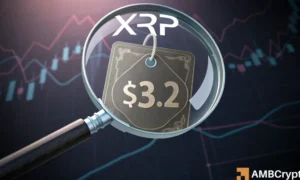The Future of Economic Statistics: Blockchain Integration by the Department of Commerce
In a groundbreaking announcement during a White House cabinet meeting on August 26, Commerce Secretary Howard Lutnick revealed that the Department of Commerce will begin issuing Gross Domestic Product (GDP) and other economic statistics using blockchain technology. Positioning blockchain as a transformative data distribution tool, Lutnick declared, “The Department of Commerce is going to start issuing its statistics on the blockchain… and we are going to put the GDP on the blockchain so people can use the blockchain for data distribution.” This initiative marks a significant step in integrating blockchain into governmental functions and reflects the Trump administration’s commitment to crypto-friendly policies.
The Significance of Blockchain in Government Data
Lutnick’s announcement signals a pivotal moment for the federal government, utilizing blockchain technology to enhance transparency, security, and efficiency in data reporting. The move aims not just to modernize how economic data is disseminated but also to create a system that is less susceptible to manipulation and fraud. By making GDP and other crucial economic statistics accessible on the blockchain, the Department of Commerce hopes to foster public trust and enable a more straightforward understanding of economic performance.
Building on Existing Federal Blockchain Initiatives
This initiative is not entirely new; it builds upon a variety of existing blockchain pilots that various federal agencies have already embarked on. The Treasury Department previously tested a blockchain-based grant distribution system designed to track drawdowns with automated reconciliation and audit trails. While this specific initiative did not launch publicly, it indicated a growing interest in blockchain applications at the federal level. Meanwhile, the Commodity Futures Trading Commission is evaluating tokenized collateral and stablecoin transactions, showcasing the wide-ranging potential of blockchain in finance. Moreover, other entities like the Small Business Administration and the Department of Defense are exploring blockchain for tasks such as fraud monitoring and supply chain authentication, respectively.
Congressional Backing for Blockchain Initiatives
The increasing focus on blockchain technology aligns with legislative developments, particularly the “Deploying American Blockchains Act of 2025.” Spearheaded by Rep. Kat Cammack and passed by the House in late June, this legislation aims to promote U.S. competitiveness in blockchain applications. By establishing a Commerce Department Blockchain Deployment Program, the bill seeks to create advisory committees that incorporate representatives from federal agencies and the private sector. This structured approach plans to assess how distributed ledger technology can benefit government operations while addressing cybersecurity concerns and ensuring regulatory compliance.
Transforming Economic Reporting and Data Accessibility
The initiative to utilize blockchain for issuing GDP figures is expected to revolutionize how economic data is collected and reported. With the technology’s inherent features, such as immutable records and real-time updates, stakeholders can access accurate data instantly. This level of transparency can mitigate discrepancies, aiding policymakers and researchers in making informed decisions. Moreover, businesses may also benefit from understanding the current economic landscape through more reliable statistics, further enhancing overall economic stability.
Economic Impacts and Future Prospects
As the Department of Commerce moves forward with this blockchain project, the potential economic impacts are noteworthy. More reliable and accessible data can lead to improved decision-making by businesses and government officials alike. In turn, this could stimulate economic growth and innovation. Additionally, by equipping agencies with blockchain capabilities, the federal government can better tackle challenges related to fraud and data manipulation, contributing to an overall healthier economy.
Conclusion: A New Era of Government Data Management
In summation, the Department of Commerce’s decision to harness blockchain technology for issuing GDP and other economic statistics is a transformative step toward modernizing government data management. As blockchain delivers on promises of integrity, transparency, and efficiency, it is likely to redefine how agencies interact with data and the public. With strong congressional support and several existing pilots paving the way, the future of government data management appears bright, potentially setting a global standard for transparency in public economic reporting.
The integration of blockchain into federal operations heralds a new era in how data is collected, reported, and utilized, emphasizing the promise of technology in improving governance and serving citizens more effectively.

















